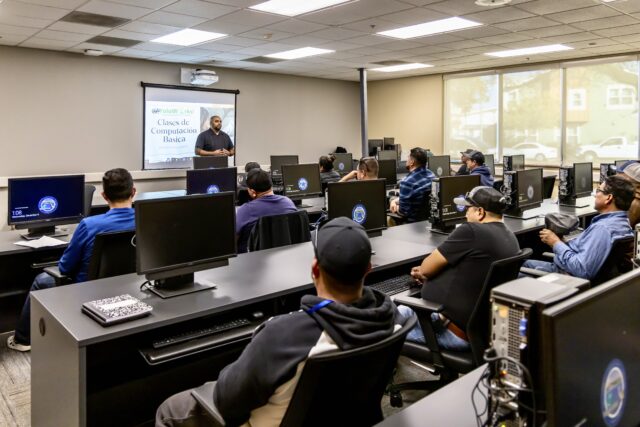Farm Credit sponsorship helps Center for Land-Based Learning launch program to upskill employees, benefitting workers and employers
As California agriculture seeks to adapt to changing markets and increased government regulations, farmers and ranchers are working hard to boost productivity and ensure that their workforce has the skills needed to be as productive as possible.

To help make that goal a reality, the Center for Land-Based Learning is launching a new program called AgHiRE, crafted specifically for the Spanish-speaking agricultural workforce and dedicated to empowering top-performing workers.
“Employers are getting pressure from all sides to become more efficient and nimble. They need workers to be as skilled and efficient as possible,” said Marisa Alcorta, the Center’s apprenticeship program director. “The program, the newest component of our California Farm Academy, is designed to equip employees with critical language skills, digital literacy and leadership training that will enable them to advance into roles with more responsibility within their organizations.”
She said the program is designed to give experienced farmworkers the skills to make them more valuable to the employer.
“A lot of employers have said they have employees who don’t speak English who they would like to move up. We needed to create a program accessible for Spanish-speaking workers. There are a lot of amazing talents working in the industry who know their job but can’t advance because of those gaps,” she said.
Alcorta noted that the curriculum was developed during more than four months of meetings with an Advisory Committee consisting of agricultural employers, educators and regulatory consultants.
“It was important to make sure industry was driving the design of this program so that it was meeting the needs of growers and their employees,” she said. Other partners included Valley Vision and YoloWorks!, the Yolo County Career Services Center.
Jacob DeBoer, Regional Marketing Manager, with American AgCredit, said Farm Credit continues to strongly support the Center because of its innovative and successful programs to inspire, educate and cultivate future generations of farmers and agricultural leaders.
“For 30 years, the Center has provided programs for students, beginning farmers and aspiring farm managers,” DeBoer said. “The new AgHiRE program builds on a successful two-year farm management apprenticeship program with the goal of providing more skills and opportunities for farmworkers, benefitting workers and employers alike. Programs like these are invaluable assets to California agriculture, and Farm Credit is proud to continue supporting the Center’s work.”
Kevin Ralph, California State President for AgWest Farm Credit, noted that Farm Credit’s support extends to the Center’s ambitious campaign to raise $10 million in public funds and private donations to allow it to further expand its efforts.
“The Center’s vision is to expand its workforce training options, launch a new bilingual farmworker upskilling program in partnership with major statewide ag groups and expand the beginning farmer and rancher apprenticeship program statewide,” Ralph said. “Farm Credit has generously supported the campaign and encourages others in the ag community to do the same.”
Farm Credit organizations supporting the Center’s programs are AgWest Farm Credit, American AgCredit, CoBank, Colusa-Glenn Farm Credit, Fresno Madera Farm Credit, Golden State Farm Credit and Yosemite Farm Credit. These organizations are part of the nationwide Farm Credit System – the largest provider of credit to U.S. agriculture.
Alcorta added that sponsorships such as Farm Credit’s are essential to the Center’s success.
“Investment by Farm Credit has really helped kick-start many of our programs and keep them going,” she said. “We couldn’t do what we do without their support, and we hope we can lean on their support in the future as we work to make programs even more relevant to employers.”
She said the first AgHiRE cohort began the program in early December and will finish in mid-March. It consists of three-hour in-person classes on Wednesdays and Fridays, with a monthly five-hour Saturday session focused on leadership and communication, totaling 87 hours of instruction.
In addition, the 25 participants are learning critical language skills and digital literacy that will enable them to advance into roles with more responsibility within their organizations. The center plans to offer another course next winter, and to add an advanced course as well for farmworkers who already have most of the basic skills.
Alcorta said the center is really excited about launching the program because it serves an important need.
“Our goal is to help farmworkers advance their careers. They deserve a pathway for professional development. And as the labor force dwindles because the industry is having to shift to mechanized labor to survive, more and more farmworkers are going to need to be trained on these soft skills and technology,” she said.
“That’s why the digital literacy piece is so critical, and I can see it expanding a lot for the advanced class.”
About Farm Credit:
AgWest Farm Credit, American AgCredit, CoBank, Colusa-Glenn Farm Credit, Fresno Madera Farm Credit, Golden State Farm Credit and Yosemite Farm Credit are cooperatively owned lending institutions providing agriculture and rural communities with a dependable source of credit. For more than 100 years, the Farm Credit System has specialized in financing farmers, ranchers, farmer-owned cooperatives, rural utilities and agribusinesses. Farm Credit offers a broad range of loan products and financial services, including long-term real estate loans, operating lines of credit, equipment and facility loans, cash management and appraisal and leasing services…everything a “growing” business needs. For more information, visit www.farmcreditalliance.com
About the Center for Land-Based Learning:
For 30 years, the Center for Land-Based Learning has been dedicated to inspiring and training the next generation of farmers, agricultural leaders, and natural resource stewards. By focusing on sustainable practices and community engagement, CLBL aims to build equitable and resilient food systems that benefit both people and the environment. For more information, visit www.landbasedlearning.org






